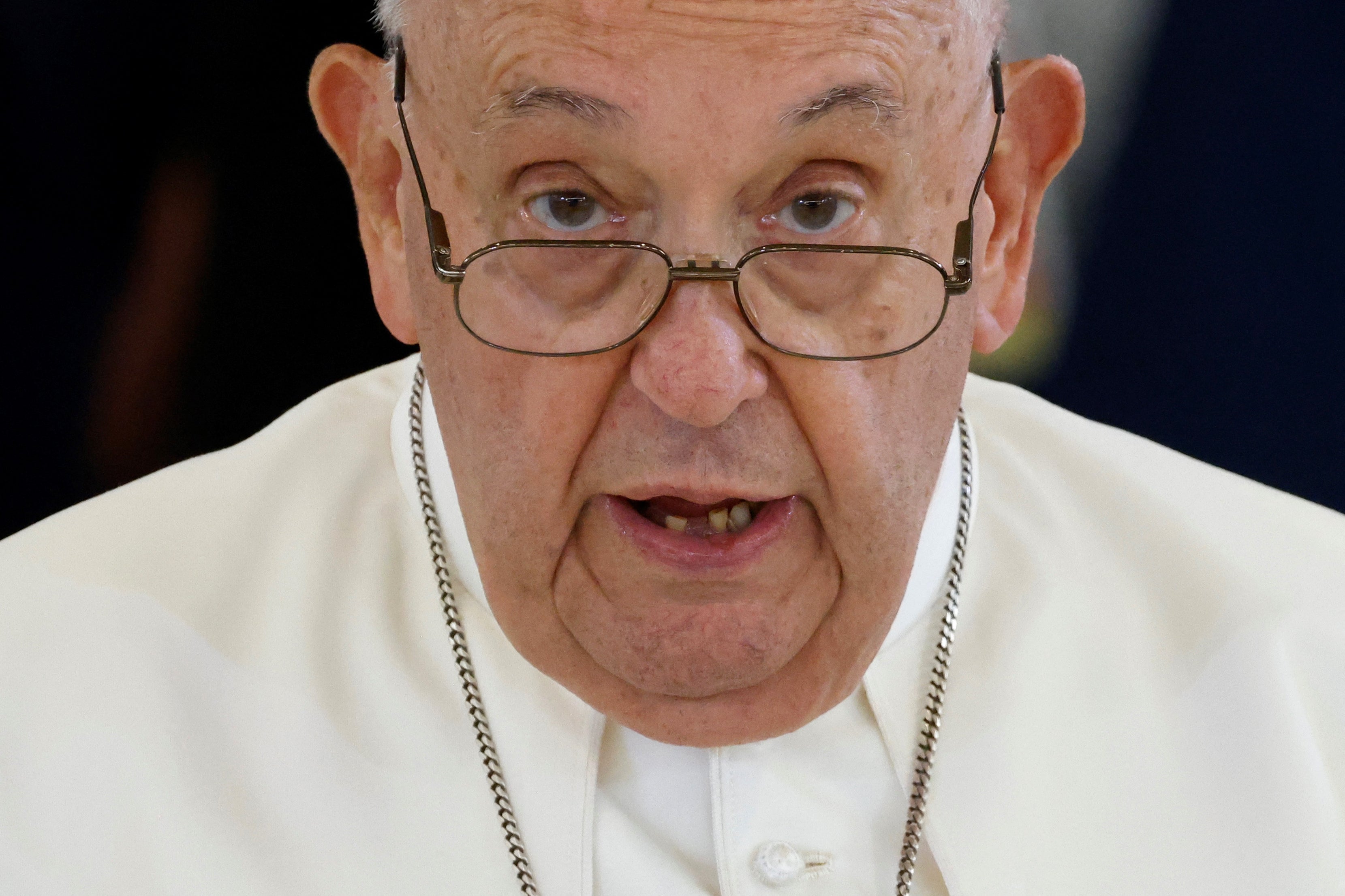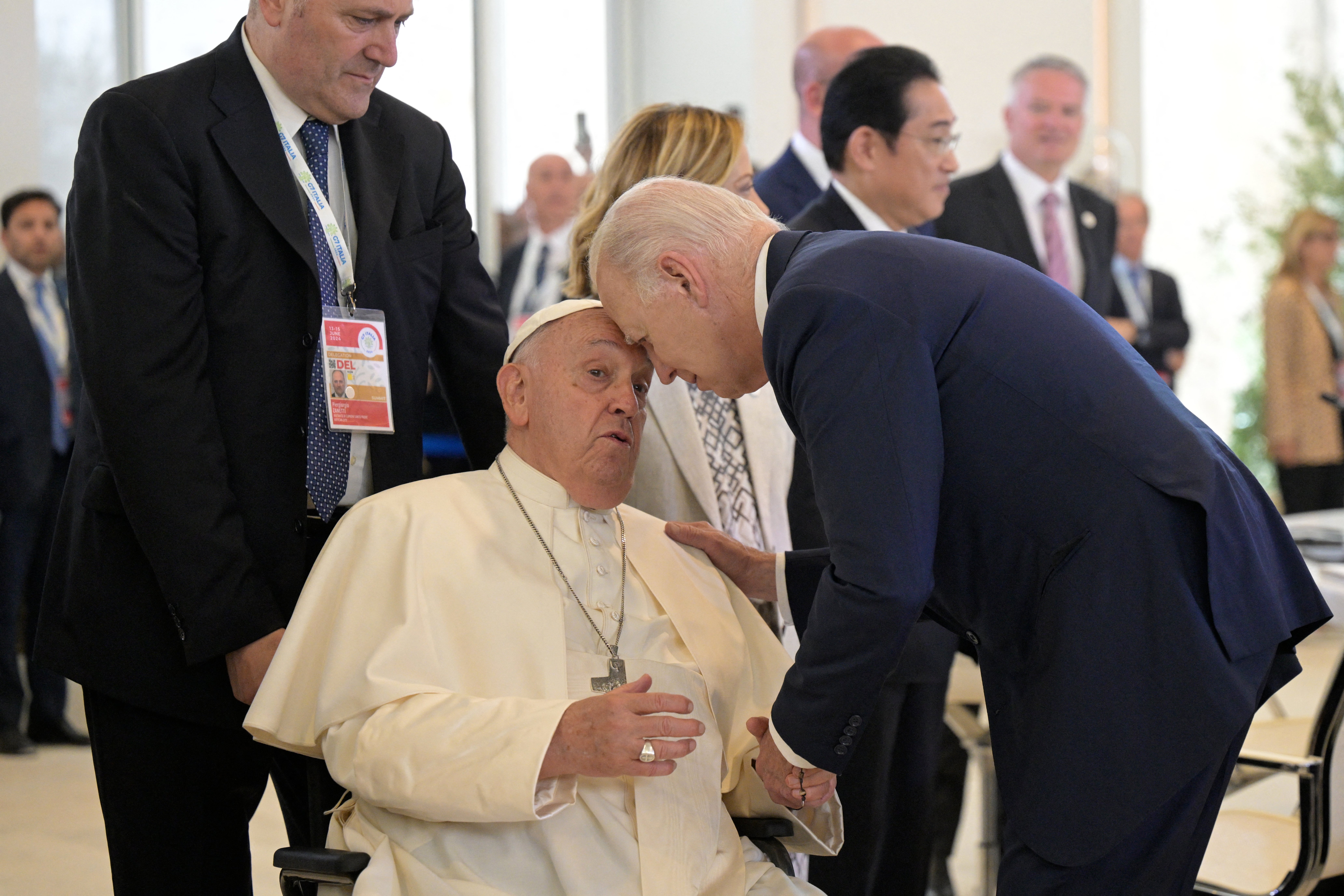Pope Francis urges G7 not to lose control of AI in historic speech
Pope Francis urges world leaders at summit in Italy that AI must not be allowed to make choices on behalf of humanity

Your support helps us to tell the story
From reproductive rights to climate change to Big Tech, The Independent is on the ground when the story is developing. Whether it's investigating the financials of Elon Musk's pro-Trump PAC or producing our latest documentary, 'The A Word', which shines a light on the American women fighting for reproductive rights, we know how important it is to parse out the facts from the messaging.
At such a critical moment in US history, we need reporters on the ground. Your donation allows us to keep sending journalists to speak to both sides of the story.
The Independent is trusted by Americans across the entire political spectrum. And unlike many other quality news outlets, we choose not to lock Americans out of our reporting and analysis with paywalls. We believe quality journalism should be available to everyone, paid for by those who can afford it.
Your support makes all the difference.Pope Francis has warned world leaders that artificial intelligence (AI) must never be allowed to gain the upper hand on humanity as he became the first pontiff to address the G7.
After being wheeled around the huge oval table where the world’s top leaders had convened in southern Italy, the 87-year-old said AI represented an “epochal transformation” for mankind, one that could inspire excitement but, equally, cause “greater injustice”.
He then implored the politicians around him, who he said bore the main burden of ensuring AI is used to benefit humanity, to “ensure and safeguard a space for proper human control” over the supercomputers.
“We would condemn humanity to a future without hope if we took away people’s ability to make decisions about themselves and their lives, by dooming them to depend on the choices of machines,” he said. “We need to ensure and safeguard a space for proper human control over the choices made by artificial intelligence programmes: human dignity itself depends on it.”
He added that “no machine should ever choose to take the life of a human being.”

The historic speech followed a warm reception for the pontiff at the G7 summit in Bari, southern Italy, attended by leaders from the US, Germany, the UK, France, Italy, Canada and Japan. Ukrainian president Volodymyr Zelensky was among the 10 additional leaders invited by Italian PM Giorgia Meloni.
Javier Milei, the Argentine president, hugged his fellow countryman as Pope Francis entered the conference room, while Canadian PM Justin Trudeau kissed him. US president Joe Biden also shared a long, whispered conversation with the pontiff.
In a draft of their closing statement, the G7 leaders said they would draw up a plan to anticipate future skills and education needs to take advantage of the pending AI revolution.
They also vowed to take action and “remedy ongoing harm” to address “unfair" business practices by China that were undermining their workers and industries, according to the draft statement,
They called on Beijing “to refrain from adopting export control measures, particularly on critical minerals”.
The draft summit stressed that the G7 was not trying to harm or thwart China’s economic development but simply “level the playing field”.
The G7 nations also pledged to take action against Chinese financial institutions that helped Russia obtain weaponry for its war against Ukraine.
Earlier this week, the US imposed fresh sanctions on China-based firms supplying semiconductors to Russia.
“China is not supplying weapons but the ability to produce those weapons and the technology available to do it, so it is, in fact, helping Russia,” Mr Biden told reporters at the Italian summit on Thursday after signing a security pact with Mr Zelensky.
Also during the first day of their meeting in southern Italy, the G7 nations agreed on a deal to provide $50bn (£39bn) of loans for Ukraine backed by interest from frozen Russian assets, hailing the accord as a powerful signal of Western resolve.
In the draft, G7 leaders said they wanted to inflict further costs on Russia for its invasion of Ukraine, and also promised sanctions against entities that helped Russia circumvent restrictions on its oil trading by transporting it fraudulently.
However, Ms Meloni ran into choppy waters over the handling of sensitive social issues in the statement summing up the work of the G7.
No direct reference to abortion was made in the final communique, with Italy refusing to bow to French pressure to include the word. The draft also sparked accusations of watering down support for LGBT+ rights compared with the statement issued at the previous meeting in Japan.
Italy said it was a diplomatic storm in a teacup and argued that the G7 had not changed its stance on either issue.
Premiers also discussed immigration, a crucial issue for Ms Meloni who is pushing Europe to help her curb illegal flows from Africa and who has launched a flagship plan to boost development in the continent to tackle the root cause of the departures.
Many of the leaders, including Mr Biden, were scheduled to leave late on Friday, and Ms Meloni said they had already agreed on the summit’s conclusions, to be approved at the end of the day.
On Saturday, there will be room for bilateral meetings for those staying on, ahead of a final press conference from Ms Meloni.
Reuters contributed to this report
Join our commenting forum
Join thought-provoking conversations, follow other Independent readers and see their replies
Comments